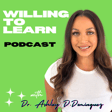
Braids, Teepees, and Warrior Traditions With Dr. JD Lopez
Dr. JD Lopez is an assistant professor, a published author, a veteran, and a tribal member of the Quechan tribe of Fort Yuma, California. Not to mention, he’s also my husband! JD joins Willing To Learn to discuss all things Native American. JD explains what it’s like growing up off the Rez, dispels some myths surrounding Native American people, and gives advice on how you can support local tribes near you.
Topics:
- Warrior Traditions and Heritage
- Indigenous Education Perspectives
- Research in Indigenous Studies
- Policy Implications and Advocacy
- Cultural Traditions and Symbols
- Historical Context and Understanding
- Indigenous Identity and Representation
- Literary Contributions and Publications
- Military Service and Veteran Experience
- Tribal Membership and Community
For more information on JD, visit: Jamesondlopez.com
Read below to access some of JD’s recommended resources from the episode:
Shop Native:
- The NTVS: www.thentvs.com
- B. Yellowtail: www.byellowtail.com
- Mean Right Hook: www.meanrighthook.com
Read Native:
- Deloria, V. (1969). Custer died for your sins: An Indian manifesto. University of Oklahoma Press.
- American Indian’s Children’s Literature by Debbie Reese: www.americanindiansinchildrensliterature.blogspot.com
- Shotton, H., Lowe, S., & Waterman, S. (2013). Beyond the asterisk: Understanding Native American college students.
FOLLOW US ON INSTAGRAM:
@willingtolearnpodcast
@ashddominguez
WATCH AND COMMENT ON OUR YOUTUBE CHANNEL - https://www.youtube.com/channel/UClC8Nj4g7u1etmBGjREi-xQ
Contact: willingtolearnpodcast@gmail.com
